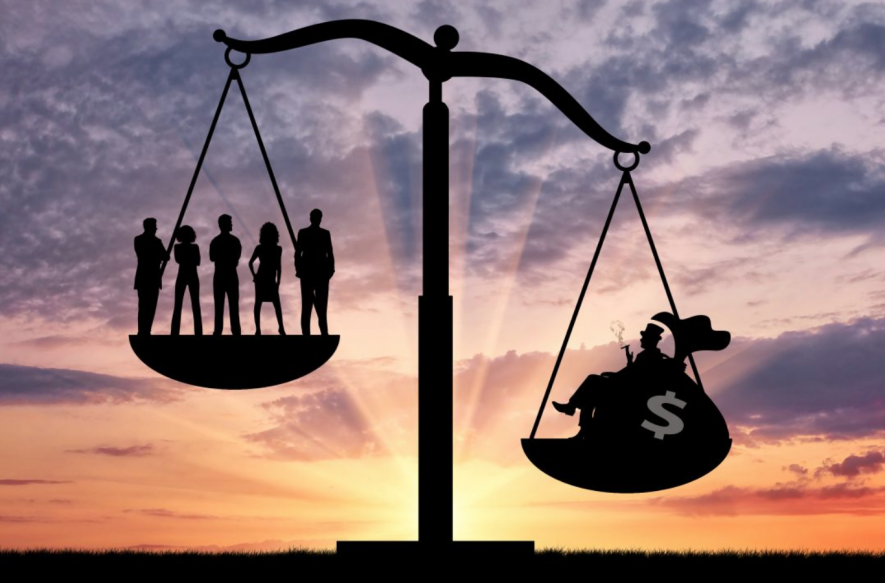Inequality Rises Steeply: 42 Billionaires Now Own as Much Wealth as Bottom 50% of World’s Population

Image Courtesy: Prazis/Shutterstock
The richest 42 people in the world hold as much as wealth as the 3.7 billion people who form the poorest half of the world's population, says a new report released by development charity Oxfam. This signals a widening of inequality over last year, when the richest 61 billionaires owned as much wealth as the bottom 50%.
The report was released on Monday to call attention to the urgent need to tackle growing inequality as the world's elite are set to gather at the World Economic Forum in Davos, Switzerland from Tuesday, 23 January onwards.
Growth under neoliberalism mostly benefits the super-rich
The report, titled 'Reward Work, Not Wealth', says that last year - the period between the second quarters of 2016 and 2017 – saw the biggest increase in the number of billionaires in history, one more every two days. There are now 2043 dollar billionaires in the world, out of which 90% are men.
The year saw the wealth of the billionaires increase by $762 billion, which is enough to end extreme poverty seven times over according to Oxfam. 82% of all growth in global wealth during the 12 months went to the richest 1% of the world, with the poorest half seeing no increase in wealth at all.
Inheritance, monopoly and cronyism are the main sources of billionaire wealth, not “hard work”, “talent” or “risk-taking”
The report lambasts the view advanced by mainstream economics that inequality provides "incentives for innovation and investment". "There is growing evidence that the current levels of extreme inequality far exceed what can be justified by talent, effort and risk-taking," says the report. "Instead, they are more often the product of inheritance, monopoly or crony connections to government."
About a third of billionaire wealth is derived from inheritance. "Over the next 20 years, 500 of the world’s richest people will hand over $2.4 trillion to their heirs – a sum larger than the GDP of India, a country of 1.3 billion people," says the report.
In drawing out the link between the wealth of billionaires and monopoly power, the report notes the example of Carlos Slim, the sixth richest man in the world, whose fortune derives from the near-complete monopoly he managed to establish over fixed line, mobile and broadband services in Mexico, resulting in negative effects for consumers and the economy.
Cronyism compounds the problem of monopoly power, as powerful private interests manipulate public policy to entrench existing monopolies and create new ones. "Privatization deals, natural resources given away below fair value, corrupt public procurement, or tax exemptions and loopholes are all ways in which well-connected private interests can enrich themselves at the expense of the public," says the report.
Oxfam estimates that approximately two-thirds of billionaire wealth in the world is the product of inheritance, monopoly and cronyism taken together.
The report criticises the US President Donald Trump for having appointed a cabinet of billionaires and for having pushed for huge tax cuts favouring the richest 1% after getting elected promising to help ordinary workers.
Oxfam surveyed over 70,000 people in 10 countries for the report. More than 75% of the surveyed people agreed or strongly agreed that the gap between the rich and the poor in their country is too large. Nearly two-thirds of the respondents thought that the gap between the rich and the poor needs to be addressed urgently or very urgently. 60% agreed or strongly agreed that it is the government's responsibility to reduce the gap between the rich and the poor.
Women, youth worst affected by policies that benefit the super-rich
The report notes the deep gender inequality prevailing in the world, where more men than women own land, shares and other capital assets, and where men are paid more for the same work than women. Men are concentrated in higher paid, higher status jobs.
Modern slavery is perhaps the most shocking element of the global labour market today, says the report. According to estimates by the International Labour Organisation (ILO), 40 million people were enslaved in 2016, 25 million of them in forced labour. Four million of those in slave labour are children.
About 43% of the youth labour force in the world is still either unemployed, or working but living in poverty, says the Oxfam report. Young people have been affected the worst by the worldwide financial crisis.
Wages not keeping pace with growth in productivity
While workers have been producing significantly more valuable things, their wages or working conditions have not kept pace with this. The ILO found that in 91 rich and developing countries, wages had failed to match increased productivity and economic growth between 1995 and 2014.
"Many countries still have no minimum wage or collective bargaining and most minimum wages are significantly lower than what is needed to survive or what could be described as a living wage," says the Oxfam report.
Women workers across the globe often suffer serious injury, health risks and sexual violence in the workplace. From sexual harassment and assault by male guests suffered by hotel workers in Dominican Republic, Canada and Thailand to urinary tract infections suffered by young women working in Bangladesh's garment factories, women workers have been at the receiving end of the neoliberal order. An Oxfam study of poultry workers in the United States found that they were wearing nappies, as they were not permitted to go to the toilet.
Weakening of trade unions increases inequality
The report notes the centrality of trade unions – which push for increased wages, rights and protections not just for their members but also for workers throughout society – in the creation of more equal and more democratic societies. But there is a downward trend in trade union density rates all over the world since 2000, as inequality increased and outsourcing and contract jobs which undermine labour rights rose in proportion.
The report says that the bargaining power of those at the top has been going up, even as the bargaining power of those at the bottom is being driven down. Corporations are consolidating more and more power, "and are under huge pressure to deliver ever greater returns to wealthy shareholders. These returns often come at the cost of workers and offer a major incentive to engage in industrial levels of tax dodging. Corporations use the mobility of their investments to force the race to the bottom between countries on tax and on wages. The threat of greater automation also puts more power in the hands of wealthy owners, and more pressure on workers."
Regulate corporations, break up monopolies, ensure more bargaining power to workers
The report advocates regulation to ensure that workers have more bargaining power, that tax havens be ended, that monopolies are broken up, and that the financial sector and technological progress benefit the majority.
It calls for more cooperatives, employee ownership models, mission-primacy, for-benefit business, social enterprises and fair-trade businesses. Business models that prioritise fairer returns, including cooperatives and employee participation in company governance and supply chains should be incentivised.
The rich should pay more taxes
Rich individuals and corporations must pay their fair share of tax, and governments should use taxation and spending to redistribute, by investing in healthcare, education and social protection to reduce inequality.
The report recommends that organisation of workers should be promoted by setting legal standards protecting the rights of workers to unionise and strike, and by rescinding all laws that go against these rights.
Corporations should prioritise paying all their employees a living wage over rewarding shareholders through dividends or buybacks and over paying bonuses to executives. They should support gender equality in the workplace by committing to the UN Women's Empowerment Principles and to relevant ILO Conventions.
They must publish companies' pay ratio between CEO and median pay, and commit to reducing this ratio to at least 20:1. Corporations should also publicly commit to supporting collective bargaining by employees, says the report.
The Oxfam report is based on data from a number of sources, including reports published by Credit Suisse, Forbes, World Bank, and Oxfam itself.
"This report confirms what workers have known for years: most of the heralded benefits of globalization are reserved for a global elite who consider themselves untouchable," said Rosa Pavanelli, General Secretary of the Public Services International. "The myths of the current model of globalization are collapsing like a house of cards and with it the credibility of its proponents and trust in political institutions. Brazen corporate tax evasion, privatisation, service cuts and decades of stagnating wages have not happened by accident. Urgent, radical action is needed to fund universal public services, decent work and redistribute wealth."
Get the latest reports & analysis with people's perspective on Protests, movements & deep analytical videos, discussions of the current affairs in your Telegram app. Subscribe to NewsClick's Telegram channel & get Real-Time updates on stories, as they get published on our website.
























